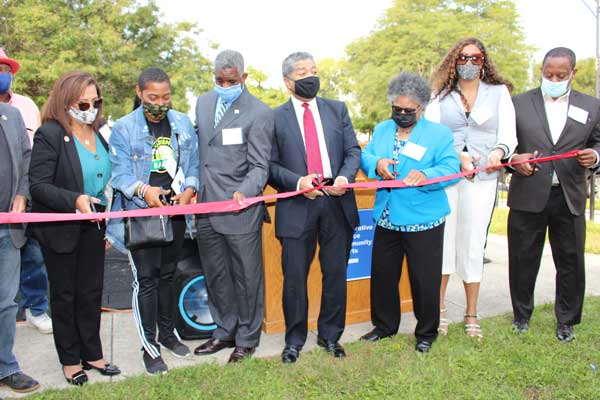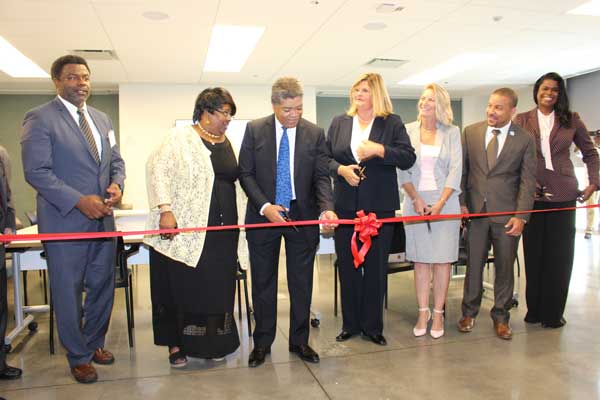Reflections from Chief Justice Anne M. Burke and guest columnist Cook County Chief Judge Timothy Evans
December 21, 2020
Goodbye 2020! Welcome 2021! As the year 2020 passes into the annuls of history, few of us – if any – will be sad to see it go. Since its appearance in March, the COVID-19 pandemic has brought unprecedented challenges and hardships for many this year. Perhaps more than any other time in the past century, as we watch that famed crystal ball drop in New York City’s Times Square or celebrate as fireworks decorate the sky, the New Year will be a symbol of a new beginning, a rebirth, a renewal – filled with the promise of better times. We await the coming of 2021 with great anticipation and hope – hope that as the new coronavirus vaccines are becoming available for broad distribution, we will be able to settle into a “new normal.”
I wish, however, that whatever this “new normal” will be, we do not let go of the positive changes that have come about due to the pandemic. In recent months, whenever I have spoken at a gathering within the legal community, I have repeated one phrase, which has become my mantra – “The coronavirus may not be the challenge we wanted, but it is the challenge we needed.” It is true.
Because of the pandemic, our court system has opened itself up to innovation, modernization, and improvement in ways we would not have thought possible. In addition, we have accomplished these changes expeditiously, largely due to the remarkable cooperation and collaboration of our judges, court personnel, and judicial stakeholders. One thing I can say with certainty is that we have embraced technology and, having discovered the benefits of using technology for conducting court operations remotely, it is unlikely our courts will ever return to the pre-COVID, near-exclusive reliance on in-person hearings.
Among the many changes that the year 2020 has brought, are the changes to the Illinois Supreme Court. In March, our esteemed colleague and friend, Justice Robert R. Thomas, retired from the bench. This month, we said goodbye to two more of our colleagues– Justices Lloyd A. Karmeier and Thomas L. Kilbride. Each of these three amazing jurists served as Chief Justice during their tenures as justices of the Illinois Supreme Court and, in that capacity, spearheaded initiatives that improved the justice system in Illinois and increased access to justice for all our citizens. I have had the privilege of serving on the Court with them for nearly 15 years and, during that time, they each were a source of wisdom, insight, and support to me personally. Our best wishes go out to them all.
This “changing of the guard” has brought new faces to the Court. After Justice Thomas’ retirement, the Court appointed Justice Michael J. Burke to fill the vacancy and he has become a valuable addition to the Court. We also welcome our two newest members of the Court, Justice David K. Overstreet and Justice Robert L. Carter, who were sworn in earlier this month. I look forward to serving with them at the upcoming January Term and beyond.
I should also mention that Justice Neville, though he has been a respected member of the Court since 2018 when he was appointed to fill the position of retiring Justice Charles E. Freeman, solidified his position on the Court with his November 2020 election win. He will remain on the Court with the other “survivors” – the three women justices – Rita B. Garman, Mary Jane Theis, and myself – who have become the senior-most members of the Court.
As Greek philosopher Heraclitus said, “The only constant in life is change.” May the changes that come in 2021 bring joy and all that is good. Happy Holidays to you and your families!
Now, I would like to introduce my guest columnist, First District Chief Judge Timothy Evans. He has been serving as the Chief Judge of the Circuit Court of Cook County since he was first elected, by unanimous vote of the First District circuit judges, in September 2001. The Circuit Court of Cook County is the largest of the 24 judicial circuits in Illinois and one of the largest unified court systems in the world. Chief Judge Evans oversees approximately 400 judges who serve Cook County’s 5.2 million residents and who adjudicate the more than 1 million cases filed annually in the court. In addition, Chief Judge Evans oversees more than 2,500 non-judicial employees who provide court-related services. On a personal note, I have known and worked with Judge Evans for several decades and have always valued our friendship. I thank Judge Evans for accepting my invitation to be the guest columnist for this December 2020 Illinois Courts Connect newsletter. I am sure you will find his remarks very informative.
Young Adult Court
By Chief Judge Timothy Evans
The time has come for the establishment of a third branch of courts at the circuit court level in the State of Illinois, a court that recognizes the intermediate stage of biological and social development between children and mature adults. The court would be known as “Young Adult Court.”
This new court would include features specific to our juvenile courts that are dedicated to addressing the delinquent conduct engaged in by children under the age of 18, and, likewise, this new court would be similar to our adult courts that are designed and best suited to address the criminal conduct of fully developed and mature adults.
But this new “Young Adult Court” would be dedicated to addressing the conduct of emerging adults between the ages of 18 and 26 and give specific consideration to the mental and physical characteristics of this age group.
This new court has become necessary and needs to be distinguished from the other two traditional courts, because the individuals in the emerging adults category have reached the chronological age of 18, the age traditionally considered to be the age of consent and adulthood and therefore no longer considered juveniles, but an age generally considered to be one when the brain is not fully developed and mature.
Emerging adults have not fully developed that part of the brain known as the pre-frontal cortex, which is that part of the brain that controls cognitive thought and planning, as well as emotional responses to stress. The pre-frontal cortex generally continues to develop until one is closer to the age of 26.
Like juveniles, who also lack a fully developed pre-frontal cortex, emerging adults are often sensation seekers who are easily led astray and frequently act without first considering the consequences of their actions.
While their actions without a fully developed brain often can be devastating to other members of our society, their personality is not irretrievable, and their conduct can be particularly responsive to restorative justice techniques pursued with them in a community court setting.
In Cook County, we have established three Restorative Justice Community Courts for emerging adults charged with nonviolent felonies or misdemeanors. They are located in Chicago: one on the city’s West Side in North Lawndale; one on the city’s South Side in Englewood and one on the city’s North Side in Avondale.

These Restorative Justice Community Courts are particularly effective for emerging adults, because these courts are dedicated not to punishing the perpetrators but, instead, healing the harm caused by the emerging adult to the victim of his conduct and the community where the victim resides or where the crime took place and stopping the improper conduct of the emerging adult.
.jpg)
In these emerging adult courts, the perpetrator (called the “participant” in these courts) admits to and apologizes to both the victim and the community for the crime he committed and for causing them harm. He also agrees to and sign a “Repair of Harm Agreement,” designed to make the victim and the community whole (i.e., by restitution, apology, public service, etc.) In addition, he agrees to take steps to help prevent the recurrence of the criminal acts against the victim or anybody else in the community (i.e., through cognitive behavior therapy, drug rehabilitation, preparation for employment, etc.).

After the requirements outlined in the Repair of Harm Agreement have been performed, the charges are dismissed against the emerging adult, and his record is expunged.
Our North Lawndale court, established in 2017, has already seen marvelous success stories. A young man named Charles Taylor, for example, had been arrested on a narcotics charge. Now he has a diploma, a forklift operator's license and a clean record.
Another graduate of the North Lawndale court, Anita Stevens, had a gun-related case. She graduated from the program in record time – less than a year – despite the coronavirus pandemic and the birth of her child. With a clean record, Ms. Stevens now runs her own business and hopes to be a mentor for other young people. “It makes me feel good as a person,” Stevens said.
Our experience with emerging adults in community courts strongly suggests Young Adult Courts for emerging adults would be far more humane than adult criminal courts, they would reduce recidivism better than conventional adult criminal courts, and they would result in the emerging adult returning to the community without a criminal record and ready to contribute to society in a positive way.